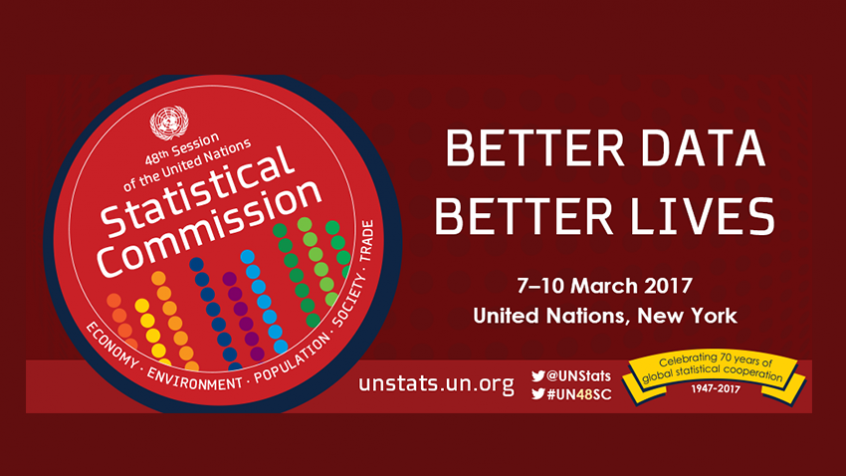
Since its first session in 1947, the UN Statistical Commission has brought together senior statisticians from across the globe to make sure that all nations speak the same statistical language, using harmonized data. The goal has been clear from the start: getting the numbers right to help improve the lives of people around the world. And today, statistics are more vital than ever before. They give shape to our societies, point us in the right direction when interventions fall short, and show us where progress was made.“I am proud to be a part of the professional community of chief statisticians from around the world who are bound together by a shared view of professional ethics and principles,” said Stefan Schweinfest, Director of UN DESA’s Statistics Division, ahead of the Commission’s 48th session, which takes place on 7-10 March 2017 at UN Headquarters in New York. The session this year will also commemorate the 70th anniversary of the Commission.
Looking back at seven decades of global statistical collaboration, many accomplishments have been made. “The Commission has always lived up to the challenges of the time. For instance, in the 1950s, it developed the System of National Accounts to measure post-war reconstruction efforts. In the 1970s, it developed Social Statistics Systems, and then in the 1990s, Environmental Statistics,” said Mr. Schweinfest. Throughout these different phases, UN DESA has been there to support this important work.
Bringing numbers and facts to the international community
In keeping with tradition, the upcoming session is expected to draw a large number of participants, bringing together some 300 statisticians from about 130 UN Member States. These are the professionals that deliver the numbers that explain progress made and provide guidance on our path forward in pursuit of peace and sustainable development.Like in previous years, the session will be preceded by the Friday Seminar on Emerging Issues on 3 March, organized by UN DESA’s Statistics Division. Putting a spotlight on “Open data – Adding value by matching access with privacy and security,” the seminar will explore how open data initiatives can provide advantages to national statistical offices; bring benefits and efficiency gains to the overall economy and to citizens; and enhance capacity and knowledge to produce high quality official statistics.During its formal plenary meetings, a wider range of statistical areas will be reviewed and new actions decided upon. Among them are agenda items on data and indicators for the 2030 Agenda for Sustainable Development, big data for official statistics, quality assurance of the global statistical system, social statistics, integration of statistical and geospatial information and tourism statistics.
Measuring progress on Sustainable Development Goals (SDGs)
Organized by UN DESA’s Statistics Division on 6 March, the side event “The Data Ecosystem: Towards integrative national information systems,” will take aim at geospatial information. This type of data links people, businesses and the economy to a particular place or geographic location, which can contribute to a fuller understanding of social and economic issues. The geographic dimension is also viewed as a key improvement to national statistics, as it provides the spatial framework and structure for collecting, processing, storing and aggregating the data. This type of data also meets the new requirements of the 2030 Agenda for Sustainable Development.
Another side event organized that same day by the department is the High-level Forum on Official Statistics, this year taking place under the theme “Working together to measure progress towards the SDGs”. It will focus on the cooperation between all members of the international statistical system and discuss how the compilation, validation and transmission of data for SDG monitoring can be further improved, taking into account national ownership of data and the need for international comparability.
Anniversary exhibit and booklet presenting Commission Chairs
An event-filled programme will also feature other celebratory components to mark this milestone in the Commission’s history. Just in time for this occasion, a special booklet will be published, presenting all the 33 men and women who have presided as chairs over this intergovernmental body since it began its work in 1947.
Delegates and other visitors at UN Headquarters in New York will also be able to enjoy an exhibit on display presenting the main achievements of the Commission in the past seven decades. A second exhibition will feature the first UN World Data Forum, which brought together over 1,400 participants from different data communities to discuss ways in which we can work together to harness the power of data for sustainable development.
As the international community moves forward to meet current and emerging development challenges, the significance of the work of the Commission will continue to increase, as we will need data more than ever to pursue the development agenda of the present and the future.
Source: UN DESA
 Welcome to the United Nations
Welcome to the United Nations